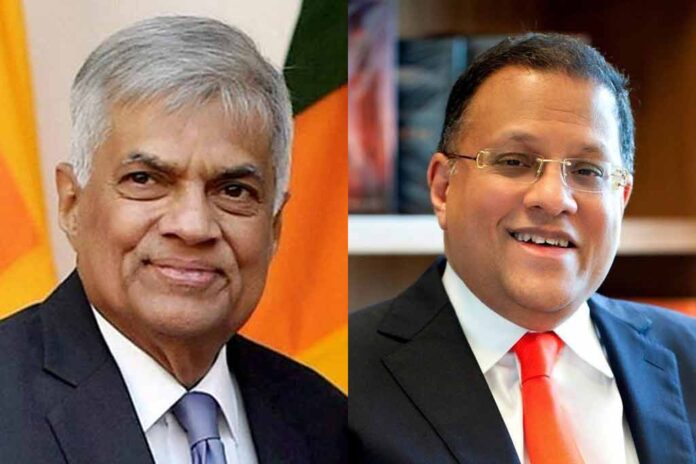Following Samagi Jana Balawegaya (SJB) MP S.M. Marikkar’s allegation in Parliament yesterday (04) that President Ranil Wickremesinghe during his recent visit to Japan met with former Governor of the Central Bank of Sri Lanka (CBSL) Arjuna Mahendran and had lunch and the President’s strong denial on such a meeting being ever taken place, a number of questions begin to surface on the sidelines of the economic meltdown befallen the island nation.
Sri Lanka is suffering from its worst economic crisis since independence, and Marikkar’s keenness to raise so much controversy amidst a million unanswered questions leading to how the recession can be recovered would be problematic, given the nature of his allegation suggesting as if the President has committed a great crime against the very fabric of Sri Lanka’s continuity amidst such hardship.
Elaborate as to why his allegation would be problematic, first we need to understand who Arjuna Mahendran actually is, what was the crime he committed and what is wrong with any event him meeting the President.
Had the President met with someone who was designated as a ‘convicted criminal’ before the Court of Law, that would be wrong of all sorts. Any meeting in a private space would be considered private, regardless of the individual’s history, but even for a President, meeting an underworld kingpin or an infamous assassin, who is yet to be charged or convicted, would be morally very wrong.
But who is Arjuna Mahendran?
Mahendran was never convicted before the Court of Law, nor was he an underworld kingpin (or an assassin for that matter) morally disgraced by the people of Sri Lanka. Mahendran’s name, among other things, is primarily affiliated with the 2015 great Central Bank Bond Scam, but he was never convicted for an offence.
But it is customary for Sri Lanka to try and convict those accused of crimes before the Media instead of the Court of Law. Such cases are being handled by the Media in a manner in which a political power is directly behind the curtain to proclaim the verdict in advance. A part of the people of the country accepts the verdict regardless of the legitimacy.
The Sri Lanka Police obtained a ‘red warrant’ against Mahendran, but under which legal provision was the warrant obtained was never publicly disclosed.
The ‘red warrant’ is the highest of all warrants. In general practice, a ‘red warrant’ is obtained against a convicted criminal or a fugitive criminal. Generally, a ‘red warrant’ can be obtained against a person involved in crimes such as drug trafficking, arms dealing, money laundering and human trafficking, and the International Police (INTERPOL) enforce such warrants considering that there is a danger of the criminal committing the same offence again.
However, the manner in which Mahendran was issued a red warrant belonged to neither. Then why did the Sri Lanka Police obtain a red warrant against the ex CBSL Chief in the first place?
There are also other warrants, such as ‘yellow warrants’ and ‘blue warrants,’ which are usually obtained prior to the issuance of a red warrant. But in this case, the Sri Lanka Police have clearly violated the procedure in which an International Red Warrant is obtained by bypassing the protocol and resorting to the latter. The Sri Lanka Police proceed themselves with the notion that their conduct is correct, given that these have not yet been challenged before an international court.
Were these commissions to be properly challenged, chances could be high that the INTERPOL step in to completely ban the use of red warrants for Sri Lanka. In retrospect, Sri Lankans who were issued red warrants but later dropped not challenging such conducts of the Police (or even those of the INTERPOL) before a local or an international court would be a terrible incitement for the Sri Lanka Police to continue the misuse of red warrants.
Coming back to the case of Mahendran, who was neither an underworld kingpin nor a hired assassin to be unconditionally and morally considered dangerous and therefore entitled to a warrant of this nature, the Government of Singapore denied the extradition of the former CBSL Governor as expected by the Sri Lankan law enforcement officers. Why?
During the previous Rajapaksa regime, the authorities made a strong effort in this regard, but the Singaporean Government denied the request, based on a thorough study into the whole incident, which convinced them to believe that this arrest, by definition, was a ‘political witch-hunt.’
Recalling a very simple example related to this, on February 04, 2018, the Criminal Investigation Department (CID) accompanied by journalists from ‘Sirasa TV’ Channel raided Mahendran’s residence. The act was singlehandedly committed by the Police on the orders of the then President Maithripala Sirisena who did not even bother to consult the former CID Chief Ravi Seneviratne. The entire operation was handled by Kili Maharajah, the media giant who owned Sirasa, on Sirisena’s wishes. LNW disclosed this incident with photographic evidence of Maharajah personally navigating the entire operation over the phone nearby.
Alas, nobody seems to remember these now..
There are many other incidents that are yet to remember. Stay tuned for more…
